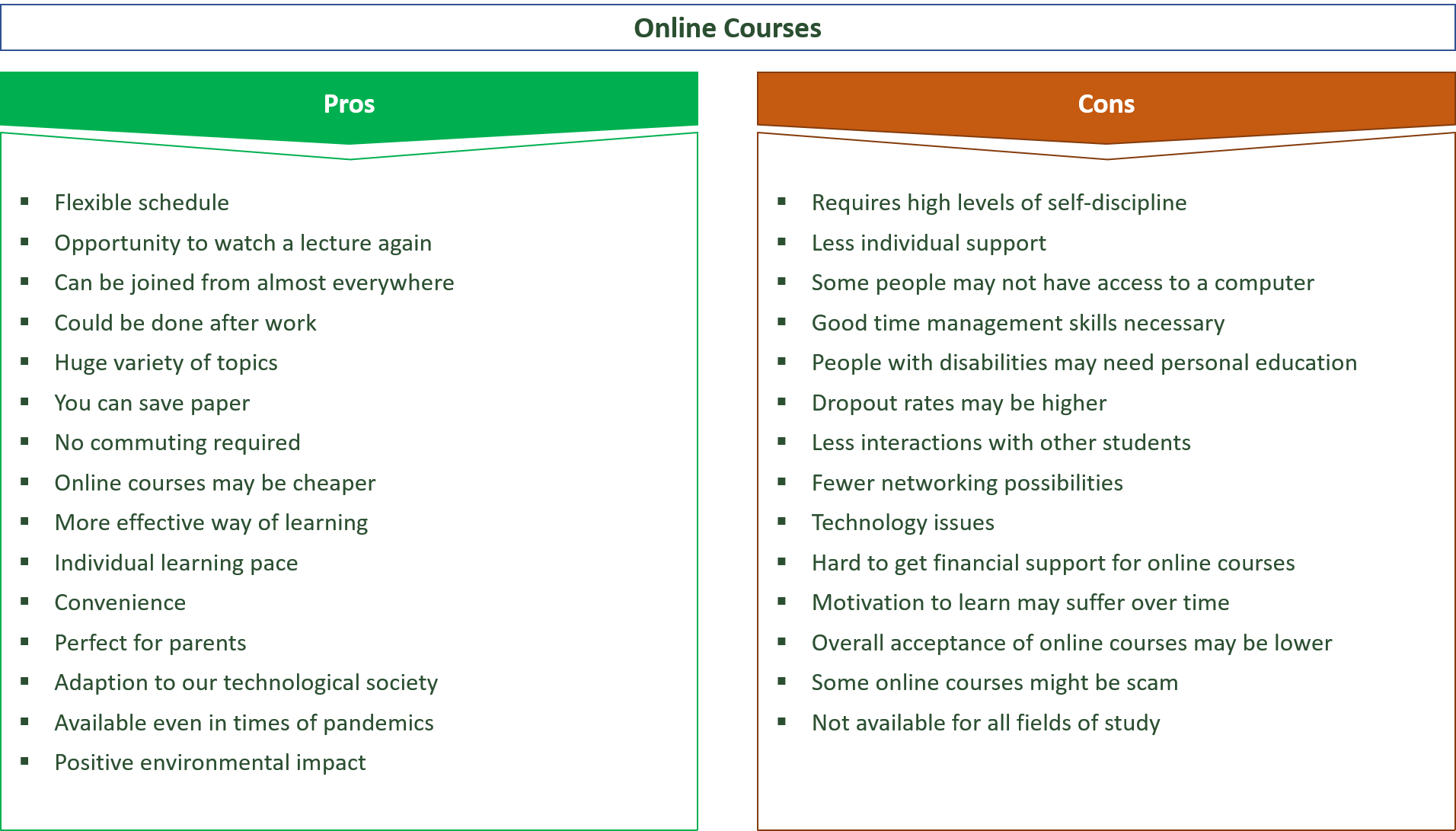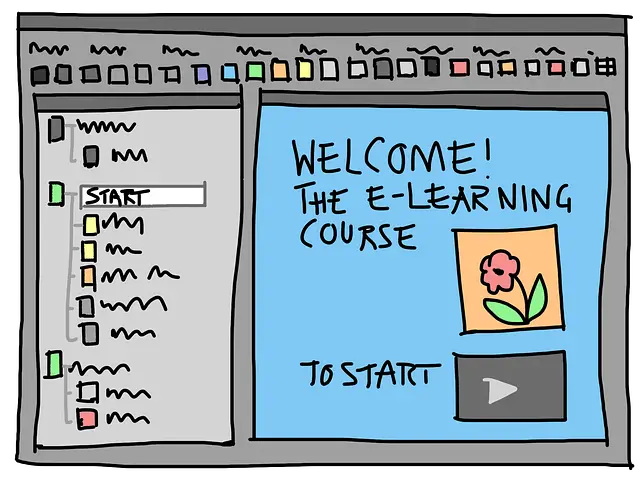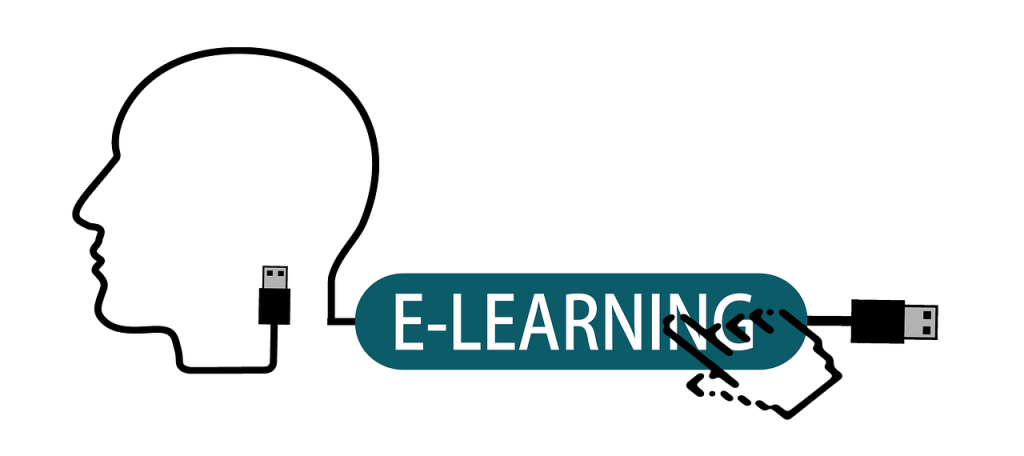“The global e-learning online market is on fire. Organizations which feel left out of this non-linear world of opportunities are seeing the need to adopt this new way of lifelong learning.”
Ronnie Scewvala, Businessman
Advantages & Disadvantages of Online Courses

Online courses have become quite popular over the past decades.
Through the maturity of the internet, billions of people now have access to online courses.
Since they are a convenient way of studying and also have many additional benefits, online classes may be a good alternative to classical education for many people.
However, online learning also has some serious downsides.
In this article, the pros and cons of online courses are examined.
Audio Lesson
Contents
Advantages of Online Classes
- Flexible schedule
- Opportunity to watch a lecture again
- Can be joined from almost everywhere
- Could be done after work
- Huge variety of topics
- You can save paper
- No commuting required
- Online courses may be cheaper
- More effective way of learning
- Individual learning pace
- Convenience
- Perfect for parents
- Adaption to our technological society
- Available even in times of pandemics
- Positive environmental impact
Flexible schedule
One important advantage of online courses is that the schedule is usually quite flexible, meaning that students do not have to watch the lecture in real-time but can watch the recorded version of it later on.
This may be quite attractive since students may enjoy the good weather outside during the day and could watch the lectures in the evening.
Compared to conventional classes, the flexibility of online courses can improve the quality of life for many people.
Opportunity to watch a lecture again
Not only are students flexible in their schedule, they also have the opportunity to watch a class multiple times.
For instance, if you have problems with a certain subject and didn’t understand everything the first time, you can rewind the lecture and watch certain parts again.
By doing so, you can use your time quite efficiently since you can concentrate on specific aspects of lectures and therefore improve your knowledge in those areas.
Can be joined from almost everywhere
Another upside of online learning is that students can join from basically everywhere in the world as long as they have access to the internet.
Thus, students are quite independent regarding their geographical location since they could attend from home but also sit in a coffee shop while watching the lectures.
Especially in poor developing countries, this is an important advantage.
In many regions, children will not be able to attend school due to high tuition fees.
These children could watch free YouTube videos in order to improve their level of education, which may give them the opportunity to get out of poverty later on.
Could be done after work
Online courses are also quite beneficial for people who have a job and want to improve their education levels.
For instance, many people work from 9 to 5 in their job, get home, eat and then spend a few more hours studying.
For those people, online classes are a great tool since they are flexible in their schedule and can study whenever they have time to do so.
Thus, the combination of work and studying can be done much more efficiently with only courses compared to classical learning facilities.
Huge variety of topics
Over the past years, the amount and the variety of online courses have greatly increased.
In almost every field of study, there are online courses with which you can improve your knowledge.
Even universities slowly but surely offer online programs since they also recognize the trend of e-learning and its advantages.
You can save paper
By joining online courses, you can also save plenty of paper since you do not need physical printouts anymore. You can simply download your lecture materials online.
By saving paper, you can not only save money but you can also reduce the deforestation issue since fewer trees have to be used for paper production.
Even though you might think that your individual impact may be quite small, the whole e-learning industry is huge and if everyone is able to save some paper, we could save many trees on a global scale.
No commuting required
Another upside of online classes is that they don’t require any kind of commuting.
For attending university, many people have to use their cars in order to get there.
However, through the use of online learning platforms, students are no longer required to attend school in a physical manner.
Thus, instead of polluting the environment through the use of cars for commuting, students can just sit on their couch and watch their lectures at home.
Online courses may be cheaper
Many online courses are also much cheaper compared to degrees from universities.
This is due to the fact that far fewer resources have to be used for online courses and the administration of those courses is usually also much more efficient.
Thus, you can also save plenty of money through the use of online courses compared to joining classical education facilities.
More effective way of learning
Since students can decide when and how much they want to learn every day, they are likely more motivated and can use their time more efficiently compared to students who have a fixed schedule and have to attend certain classes every day at a specific time.
Thus, students may use their time more efficiently through online courses.
Individual learning pace
Online courses also make it possible to have an individual learning pace.
For example, some students learn much faster than others.
Students who need more time to learn and understand the course material could watch lectures again and improve their knowledge in smaller steps, while students who are fast learners could even skip some lectures.
By giving students the opportunity to learn at an individual pace, students can use their time much more efficiently.
Convenience
Many students also admit that it is much more convenient to attend online courses compared to sitting in crowded lecture halls.
By sitting on a couch at home and watching courses, students could relax and study at the same time, which may drastically improve their overall quality of life since their stress levels might be significantly lower.
Perfect for parents
E-learning is especially suitable for parents who want to educate themselves but also have to take care of their children.
Since they could watch lectures while keeping an eye on their kids, e-learning is a great way to give parents more flexibility to manage their family and also to improve their education level at the same time.
Adaption to our technological society
Our technological progress is quite rapid and pretty soon, our world will become even more connected and digitalized.
Online courses are a great way for students to learn online skills.
These skills will be quite valuable for their future careers since for most jobs, at least a certain amount of digital understanding will be necessary.
People who suffer from the so-called digital illiteracy will have great problems to compete for jobs in the future.
Available even in times of pandemics
As we have already experienced, pandemics can lead to a shutdown of our conventional daily life, including educational institutions like universities.
However, even in such hard times, online learning can be a great tool to use your time efficiently since online courses are still working in times of pandemics.
Thus, you can stay safe in your home while getting the education you need instead of attending crowded lecture halls with the risk of getting infected.
Positive environmental impact
Many of the arguments in favor of online courses also imply a certain positive impact on our environment.
Through the use of less paper, we can mitigate the deforestation problem and can slow down global warming to a certain extent.
Since with online courses, there is less need for commuting, we can also reduce all kinds of pollution.

Disadvantages of Online Courses
- Requires high levels of self-discipline
- Less individual support
- Some people may not have access to a computer
- Good time management skills necessary
- People with disabilities may need personal education
- Dropout rates may be higher
- Fewer interactions with other students
- Fewer networking possibilities
- Technology issues
- Hard to get financial support for online courses
- Motivation to learn may suffer over time
- Overall acceptance of online courses may be lower
- Some online courses might be a scam
- Not available for all fields of study
Requires high levels of self-discipline
Online courses require a high level of self-discipline. At home, you can be distracted by so many different things.
Maybe your phone is ringing all the time or you get many messages every day. Maybe you want to watch your favorite TV show instead of learning.
Maybe you are just tired and unmotivated. All those things might prevent you from effective learning.
Thus, in order to get a proper learning experience, you have to make sure that you can limit the distractions at home.
Less individual support
Even though online courses have several advantages, an important issue with online courses is that they usually provide less individual support.
For instance, if you attend courses at your university, you could ask questions in person almost all the time.
However, in online courses, you might have to wait a few days until you get a response.
This may limit your personal learning experience to a certain extent and may prevent you to fully understand the education material.
Some people may not have access to a computer
There are also many poor people on our planet who don’t have access to computers and to the internet and can therefore not use online courses to improve their education levels at all.
Thus, for these people, online learning is not an option and they still have to learn from books and often through self-studying since their parents are not able to send them to school or to college due to a lack of money.
Good time management skills necessary
Many online courses also require participants to take part in an exam to complete the course.
This means that students have to prepare for those exams.
If students are not able to manage their time properly, chances are that at least some of them will fail the exam simply due to the fact that they were not able to start learning early enough.
People with disabilities may need personal education
There are also students who need much more personal assistance due to learning disabilities.
Those students are not able to learn properly solely through online courses and need at least some help from a professional.
Thus, for some groups of students, self-studying and e-learning may not suitable and those students need proper learning assistance instead.
Dropout rates may be higher
Since it is quite easy to lose the motivation for self-studying, dropout rates for online courses may be much higher compared to regular college lessons.
This is due to the fact that at college, teachers try to motivate their students in order to achieve good grades and to complete the course.
In contrast, it is much more difficult to stay motivated at home when nobody is pushing you and the chances that you finally quit your online course may be significantly higher.
Fewer interactions with other students
The interaction with other students is one main reason why many students like to attend university.
It is quite interesting to meet people from different regions and to connect with each other.
You can also make really good friends at college.
Through online courses, all of this is not really possible.
Sure, you might have the opportunity to chat from time to time with other students of your online course, however, there will likely not be such a strong connection between you and them.
Fewer networking possibilities
Networking is another important aspect of attending university for many people.
If you connect to many people on campus, chances are that you will have many connections to different companies in the future.
This may give you an important advantage to get a job at those firms.
The networking aspect is completely missing in most online courses, which may be a huge disadvantage of online classes compared to traditional education models.
Technology issues
There might also be some technical issues related to online courses.
These courses may sometimes have system requirements which not all people will be able to meet.
For instance, your computer may not have enough RAM or your computer operating system may be outdated.
Especially people who are not familiar with computer technology might have a hard time dealing with technical issues.
Hard to get financial support for online courses
In most countries, it is quite hard to get financial aid for online courses.
While some states and institutions provide scholarships for students, those scholarships can usually not be used for online courses.
Thus, especially for talented people who may be able to get scholarships from universities, it might be a better idea to join those universities instead of going for online education.
Motivation to learn may suffer over time
Some students are also quite motivated in the first months of their online course.
However, many of them lose their motivation over time, which might result in quitting courses or also in quite bad grades.
Therefore, online courses are usually suitable for people who have a high level of self-discipline since those people are more likely to complete their online courses.
Overall acceptance of online courses may be lower
Another problem of only courses is that the overall acceptance and the reputation are often quite low.
Many companies still prefer students from conventional universities over students who only got an online degree.
This may translate into worse job opportunities for students with online degrees and may also translate into lower salaries.
Some online courses might be a scam
Only courses also greatly vary in their quality. While some online classes are of pretty high quality, many of them are often low quality or even scam.
Since everyone is allowed to make and distribute an online course, the overall quality of online courses is usually much lower compared to colleges and universities.
However, there might be exceptions to the rule. If you plan to sign up for an online course, make sure to check out the reputation of the course provider before entering the course!
Not available for all fields of study
Although online courses are offered for a variety of different topics, there are also many niches for which online courses do not yet exist.
Thus, for those specialized areas, it might be a good idea to join classical education facilities instead.

Top 10 E-Learning Pros & Cons – Summary List
| E-Learning Pros | E-Learning Cons |
|---|---|
| Flexible class schedule | Requires self-discipline |
| Possibility to watch a lecture again | Good time management necessary |
| Geographical independence | Less interaction with other students |
| Could be used after work | Fewer networking opportunities |
| No commuting necessary | Technology problems |
| Eco-friendly | Reputation of online courses may be low |
| Individual pace | Not available for all niches |
| Perfect for parents | High variance of quality |
| High level of convenience | Higher dropout rates |
| Efficient way of learning | Not suitable for everyone |
Conclusion
Online courses can be a great way to improve your education level.
E-learning has several important advantages and will therefore significantly grow in popularity in the future.
However, there are also some downsides to online classes.
Therefore, you should make sure to check what you get for your money before joining those courses.
If you inform yourself properly, online courses could be a valid alternative to the classical education system for you.
Sources
https://en.wikipedia.org/wiki/Educational_technology
https://en.wikipedia.org/wiki/Online_learning_in_higher_education
https://economictimes.indiatimes.com/definition/e-learning

About the author
My name is Andreas and my mission is to educate people of all ages about our environmental problems and how everyone can make a contribution to mitigate these issues.
As I went to university and got my Master’s degree in Economics, I did plenty of research in the field of Development Economics.
After finishing university, I traveled around the world. From this time on, I wanted to make a contribution to ensure a livable future for the next generations in every part of our beautiful planet.
Wanna make a contribution to save our environment? Share it!
